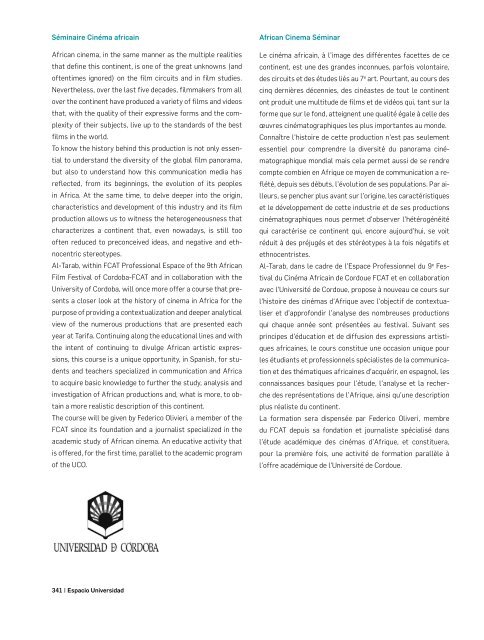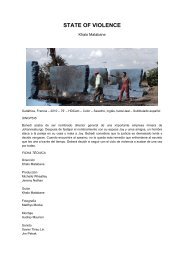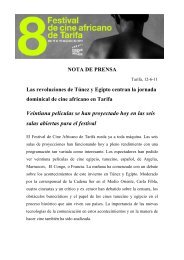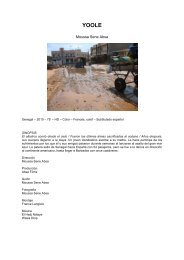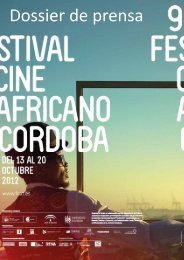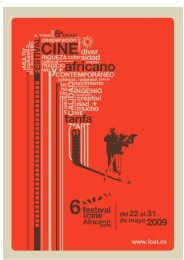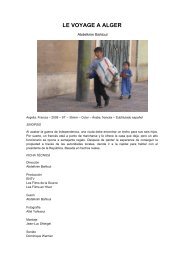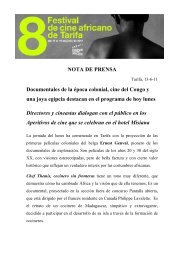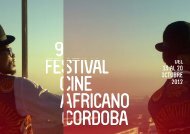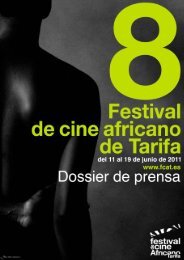Catálogo - FCAT
Catálogo - FCAT
Catálogo - FCAT
You also want an ePaper? Increase the reach of your titles
YUMPU automatically turns print PDFs into web optimized ePapers that Google loves.
Séminaire Cinéma africain<br />
African cinema, in the same manner as the multiple realities<br />
that define this continent, is one of the great unknowns (and<br />
oftentimes ignored) on the film circuits and in film studies.<br />
Nevertheless, over the last five decades, filmmakers from all<br />
over the continent have produced a variety of films and videos<br />
that, with the quality of their expressive forms and the complexity<br />
of their subjects, live up to the standards of the best<br />
films in the world.<br />
To know the history behind this production is not only essential<br />
to understand the diversity of the global film panorama,<br />
but also to understand how this communication media has<br />
reflected, from its beginnings, the evolution of its peoples<br />
in Africa. At the same time, to delve deeper into the origin,<br />
characteristics and development of this industry and its film<br />
production allows us to witness the heterogeneousness that<br />
characterizes a continent that, even nowadays, is still too<br />
often reduced to preconceived ideas, and negative and ethnocentric<br />
stereotypes.<br />
Al-Tarab, within <strong>FCAT</strong> Professional Espace of the 9th African<br />
Film Festival of Cordoba-<strong>FCAT</strong> and in collaboration with the<br />
University of Cordoba, will once more offer a course that presents<br />
a closer look at the history of cinema in Africa for the<br />
purpose of providing a contextualization and deeper analytical<br />
view of the numerous productions that are presented each<br />
year at Tarifa. Continuing along the educational lines and with<br />
the intent of continuing to divulge African artistic expressions,<br />
this course is a unique opportunity, in Spanish, for students<br />
and teachers specialized in communication and Africa<br />
to acquire basic knowledge to further the study, analysis and<br />
investigation of African productions and, what is more, to obtain<br />
a more realistic description of this continent.<br />
The course will be given by Federico Olivieri, a member of the<br />
<strong>FCAT</strong> since its foundation and a journalist specialized in the<br />
academic study of African cinema. An educative activity that<br />
is offered, for the first time, parallel to the academic program<br />
of the UCO.<br />
African Cinema Séminar<br />
Le cinéma africain, à l’image des différentes facettes de ce<br />
continent, est une des grandes inconnues, parfois volontaire,<br />
des circuits et des études liés au 7 e art. Pourtant, au cours des<br />
cinq dernières décennies, des cinéastes de tout le continent<br />
ont produit une multitude de films et de vidéos qui, tant sur la<br />
forme que sur le fond, atteignent une qualité égale à celle des<br />
œuvres cinématographiques les plus importantes au monde.<br />
Connaître l’histoire de cette production n’est pas seulement<br />
essentiel pour comprendre la diversité du panorama cinématographique<br />
mondial mais cela permet aussi de se rendre<br />
compte combien en Afrique ce moyen de communication a reflété,<br />
depuis ses débuts, l’évolution de ses populations. Par ailleurs,<br />
se pencher plus avant sur l’origine, les caractéristiques<br />
et le développement de cette industrie et de ses productions<br />
cinématographiques nous permet d’observer l’hétérogénéité<br />
qui caractérise ce continent qui, encore aujourd’hui, se voit<br />
réduit à des préjugés et des stéréotypes à la fois négatifs et<br />
ethnocentristes.<br />
Al-Tarab, dans le cadre de l’Espace Professionnel du 9 e Festival<br />
du Cinéma Africain de Cordoue <strong>FCAT</strong> et en collaboration<br />
avec l’Université de Cordoue, propose à nouveau ce cours sur<br />
l’histoire des cinémas d’Afrique avec l’objectif de contextualiser<br />
et d’approfondir l’analyse des nombreuses productions<br />
qui chaque année sont présentées au festival. Suivant ses<br />
principes d’éducation et de diffusion des expressions artistiques<br />
africaines, le cours constitue une occasion unique pour<br />
les étudiants et professionnels spécialistes de la communication<br />
et des thématiques africaines d’acquérir, en espagnol, les<br />
connaissances basiques pour l’étude, l’analyse et la recherche<br />
des représentations de l’Afrique, ainsi qu’une description<br />
plus réaliste du continent.<br />
La formation sera dispensée par Federico Oliveri, membre<br />
du <strong>FCAT</strong> depuis sa fondation et journaliste spécialisé dans<br />
l’étude académique des cinémas d’Afrique, et constituera,<br />
pour la première fois, une activité de formation parallèle à<br />
l’offre académique de l’Université de Cordoue.<br />
341 | Espacio Universidad


